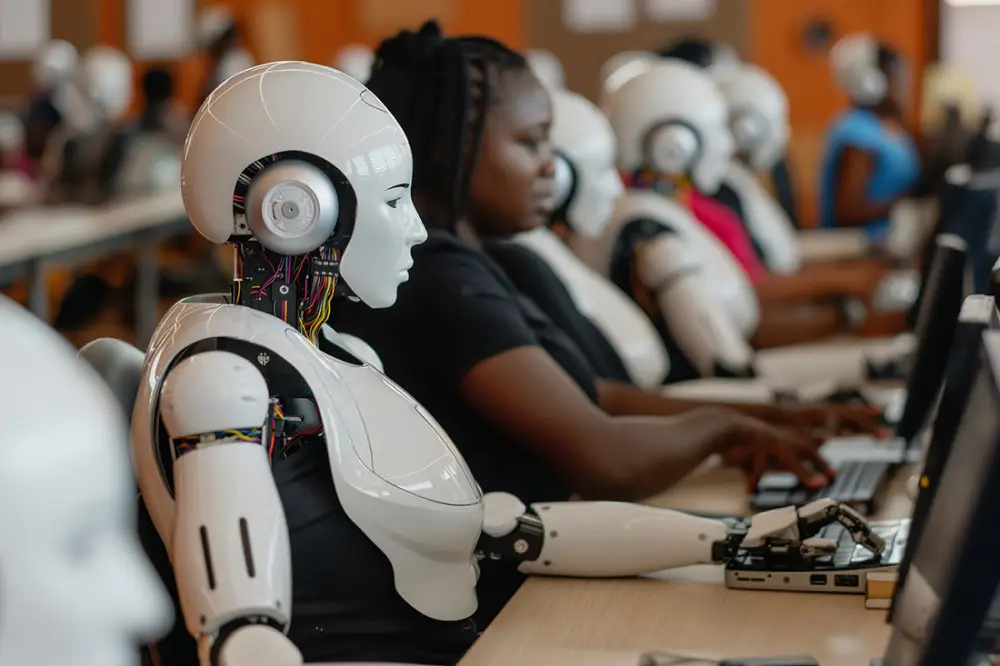As technology advances at an unprecedented pace, many individuals are concerned that they can be fired and replaced by Artificial Intelligence (AI) at any moment. This technological advancement poses a risk to employees’ job security, career sustainability, and the evolving landscape of the modern workforce. In this blog, we explore the capabilities of AI, employee terminations related to AI, and how employees can adapt to these changes.
Artificial Intelligence in the workplace
As AI technologies are being integrated into various sectors, concerns over being replaced by AI are becoming prevalent. The rise of AI revolutionizes the way tasks are being performed. Areas such as manufacturing, customer service, finance, and transportation have been affected by AI due to its efficiency and productivity. Some of the key ways AI is impacting jobs include:
- Automation of Repetitive Tasks: AI systems excel at performing repetitive tasks with precision, which reduces the need for human intervention. An example is the replacement of cashiers with self-checkout kiosks.
- Data Analysis: AI can process and analyze extensive amounts of data quickly, providing insights that would take humans much longer to uncover.
- Customer Interactions: AI-powered chatbots and virtual assistants can now be found on most websites. They handle routine customer inquiries while offering quick and consistent responses.
Termination without cause
Termination without cause occurs when an employer dismisses an employee without providing a specific reason. Employers may terminate employees without cause due to economic downturns, organizational restructuring, or changes in business strategy. This type of termination is typically governed by employment contracts and labour laws. Key aspects include:
- Notice Period: Employers are often required to provide advance notice or pay in lieu of notice when terminating an employee without cause.
- Severance Pay: Depending on the jurisdiction and the employee’s tenure, severance pay might be mandated to help ease the transition.
- Employment Contracts: Specific terms related to termination without cause are often outlined in employment contracts, which can provide additional protections or stipulations.
Can AI be a reason for termination?
Unfortunately, your employer can terminate your employment and fill your position with artificial intelligence. However, there are several considerations:
- Legal Compliance: Employers must adhere to local labour laws and regulations concerning termination. These laws often require notice periods or severance pay, even if AI is the reason for the termination.
- Contractual Obligation: Employment contracts may have specific clauses related to termination. Employers must comply with these terms to avoid legal repercussions.
- Ethical Considerations: Beyond legal obligation, ethical considerations play a role. Companies may face backlash if they are perceived as treating employees unfairly, especially if mass terminations occur due to AI adoption.
- Workplace Morale: Replacing human workers with AI can affect workplace morale and company culture. Employers need to balance efficiency gains with the potential impact on remaining employees.
Should I be worried about AI taking my job?
While it is possible for your employer to fill your role with AI, it still cannot replace most jobs as it cannot fully replicate human cognition and consciousness. For most jobs, it is unlikely that AI will replace your job altogether, as consumers still prefer personalized support over AI. However, it can take on some of your daily tasks and likely change how you work. Rather than directly replacing jobs, AI enables humans to be more productive and work faster. For example, AI technologies can assist developers with drafting requirements, coding, testing, and documentation.
Skills AI cannot replace
Despite these advancements, certain human skills, such as creativity, emotional intelligence, critical thinking, and leadership, remain irreplaceable by AI. AI can instantly generate articles, music, and art, but it lacks the warmth and artistic expression that humans bring. Human interactions are very complex, which is why jobs that require empathy, such as therapists or psychologists, are extremely difficult for AI to perform effectively.
While AI can provide solutions by combining existing data in unique ways, it often struggles with problems that require thinking outside the box because it doesn’t “think” in the same way humans do. Additionally, leadership and management are areas where humans excel, as they require motivation, inspiration, and the ability to navigate interpersonal dynamics. These are the human interactions AI cannot replace.
Takeaway
The integration of AI into the workplace is inevitable. While the adoption of AI in the workplace can lead to job displacement and terminations without cause, the impact varies across industries and job roles. Therefore, the actual likelihood and impact depend on various factors, including technological advancement and legal frameworks.
So, can you be fired and replaced by AI? Yes, the potential exists. It may change the nature of certain jobs, but it’s more about evolving with technology rather than being replaced by it.
If you are an employer or employee who needs assistance with workplace matters, including questions you may have regarding a termination, we encourage you to contact the employment experts at Sultan Lawyers. Contact us by filling out an online form or by telephone at 647-951-5925 today.
Your Case: Our Priority.
At Sultan Lawyers PC, we are the only firm specializing exclusively in employment and immigration law. Whether your case is straightforward or complex, we have the experience and commitment to achieve the best possible outcome. Trust us to navigate the toughest challenges with you.



